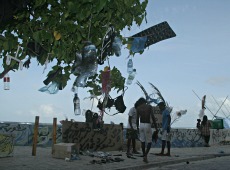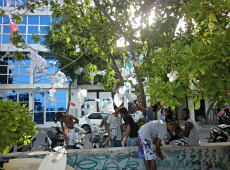Former President Mohamed Nasheed has called on the government to reinstate the concession agreement with Indian infrastructure giant GMR to develop and manage Ibrahim Nasir International Airport (INIA).
In 2010, GMR-Malaysia Airports Holdings Berhad (MAHB) consortium, the government of former President Mohamed Nasheed and Maldives Airport Company Limited (MACL) entered into a 25 year concession agreement worth US$511 million (MVR 7.787 billion).
The agreement charged the GMR-MAHB consortium with the management and upgrading of INIA within the 25 year contract period.
However in November 2012, the government of President Dr Mohamed Waheed declared the developer’s concession agreement void and ordered it to leave the country within seven days.
A last minute injunction from the Singapore High Court during arbitration proceedings was overturned on December 6, after Singapore’s Chief Justice Sundaresh Menon declared that “the Maldives government has the power to do what it wants, including expropriating the airport.”
GMR is now seeking upwards of US$1 billion in compensation for the sudden termination, while at least one of the project’s lenders has called in loans that were guaranteed by the Finance Ministry at the time the contract was signed.
The Maldivian government is contending in court that it owes nothing as the contract was void ab initio – invalid from the outset – and therefore clauses relating to termination and compensation did not apply.
Should the argument of void ab initio fail, the government has claimed the second legal grounds on which it would argue in favour of termination of the contract would be that the contract had been ‘frustrated’ – an English contract law doctrine which acts as a device to set aside contracts where an unforeseen event either renders contractual obligations impossible, or radically changes the party’s principle purpose for entering into the contract.
The case is currently in the arbitration and is set to take place in Singapore with using Maldives Airport Co Ltd v GMR Malé International Airport Pte Ltd as a reference point.
The Attorney General’s Office has previously stated that the Maldives will be represented by Singapore National University Professor M Sonaraja, while former Chief Justice of the UK, Lord Nicholas Addison Phillips, will represent GMR.
The arbitrator mutually agreed by both GMR and the government is retired senior UK Judge, Lord Leonard Hubert Hoffman.
Deal was “highly beneficial to the Maldives”: Nasheed
Nasheed in the statement released by his office on Monday said the agreement would have been highly beneficial to the country’s economy and would have boosted investor confidence in the Maldives.
“The agreement was entered into after a transparent international bidding process and under the consultation from the International Finance Corporation (IFC). The agreement also gave confidence to foreign investors who had been interested in investing in the Maldives,” read the statement.
Nasheed said the concession agreement had been the single largest foreign investment in the country’s history, and noted that it had been terminated for political reasons.
The statement also alleged the current government gave little consideration to the repercussions of terminating such an agreement, which included worsening bilateral ties, hindering development, and lowering investor confidence in the country.
The statement also acknowledged recent remarks by former President Maumoon Abdul Gayoom – whom Nasheed defeated in the 2008 presidential elections.
Gayoom blamed Nasheed for not obtaining parliamentary approval and “consulting all political parties” before signing the deal with the GMR-Malaysian Airports consortium.
“This was a mistake. Had he consulted all political parties, the public would not have formed the impression that corruption had taken place,” Gayoom was reported as saying in the Hindu.
“Then we told the next President Mr Waheed that he should hold discussions with the GMR Group and the Indian government to arrive at an acceptable solution, after which the government was free to act on its own. Unfortunately, this was not done and suddenly there was this unhappy ending.”
Nasheed’s office however emphasised that the government was legally able to enter into such an agreement and that this was in line with the section 6 of the Public Finance Act.
Gayoom had told Indian media that former President Mohamed Nasheed – whose government was controversially replaced in February last year – had to take the majority of blame for the GMR contract dispute, despite not being in office at the time of its cancellation.
“The GMR experience was not a very good one for us. It began badly with [Nasheed] not informing parliament,” Gayoom was reported as saying in the Indian Express.
Nasheed meanwhile condemned President Waheed’s “negligent” decision to evict GMR for political gain without giving due consideration to bilateral ties with India.
Waheed’s Special Advisor Dr Hassan Saeed – who was a fierce critic of the GMR deal before its cancellation – in November last year appealed to Prime Minister Singh to terminate the GMR deal, writing that “GMR and India ‘bashing’ is becoming popular politics”.
While in opposition in December 2011, the DQP also released a 24 page pamphlet alleging that allowing GMR to develop Ibrahim Nasir International Airport (INIA) was “paving the way for the enslavement of Maldivians in our beloved land”, and warning that “Indian people are especially devious”.
Former Home Minister Dr Mohamed Jameel Ahmed, the DQP’s Deputy Leader at the time of the pamphlet’s publication, was recently unveiled as the running mate of Gayoom’s party Progressive Party of Maldives (PPM) Presidential candidate Abdulla Yameen – Gayoom’s half brother.
Nasheed meanwhile called on parliament to take prompt action and said that it was important for it to seek a quick remedy to the issue.
“The decision [to cancel] was made without consulting the views of major political parties and resulted in incalculable damage to the country and its economy,” Nasheed’s statement read.



